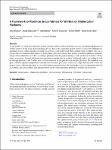Item Infomation
Full metadata record
| DC Field | Value | Language |
|---|---|---|
| dc.contributor.author | Anis El, Rabaa | - |
| dc.contributor.author | Shady, Elbassuoni | - |
| dc.contributor.author | Jihad, Hanna | - |
| dc.date.accessioned | 2023-04-27T01:16:08Z | - |
| dc.date.available | 2023-04-27T01:16:08Z | - |
| dc.date.issued | 2023 | - |
| dc.identifier.uri | https://link.springer.com/article/10.1007/s41019-023-00213-y | - |
| dc.identifier.uri | https://dlib.phenikaa-uni.edu.vn/handle/PNK/8336 | - |
| dc.description | CC BY | vi |
| dc.description.abstract | As the number of online labor platforms and the diversity of jobs on these platforms increase, ensuring group fairness for workers needs to be the focus of job-matching services. Risk of discrimination against workers occurs in two different job-matching services: when someone is looking for a job (i.e., a job seeker) and when someone wants to deploy jobs (i.e., a job provider). To maximize their chances of getting hired, job seekers submit their profiles on different platforms. Similarly, job providers publish their job offers on multiple platforms with the goal of reaching a wide and diverse workforce. In this paper, we propose a theoretical framework to maximize group fairness for workers 1) when job seekers are looking for jobs on multiple platforms, and 2) when jobs are being deployed by job providers on multiple platforms. | vi |
| dc.language.iso | en | vi |
| dc.publisher | Springer | vi |
| dc.subject | Online Labor Platforms | vi |
| dc.title | A Framework to Maximize Group Fairness for Workers on Online Labor Platforms | vi |
| dc.type | Book | vi |
| Appears in Collections | ||
| OER - Công nghệ thông tin | ||
Files in This Item:

